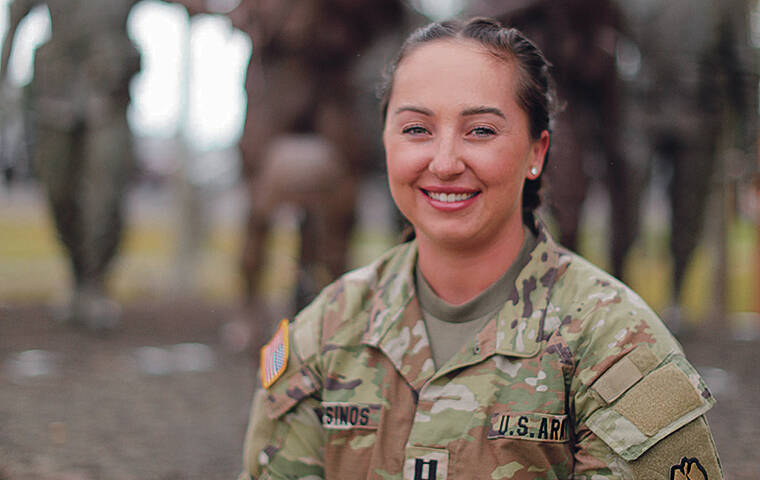
Mahalo for supporting Honolulu Star-Advertiser. Enjoy this free story!
Two Schofield Barracks soldiers played a key role in crafting reforms in how the Army handles pregnant soldiers and new parents.
Secretary of the Army Christine Wormuth sent out a memo Thursday to commanders outlining the changes, which incorporate “evidence-based health and wellness guidance to improve quality of life, promote flexibility, and enable all Soldiers to safely continue their duties, return to readiness, perform critical assignments, and advance in their careers while growing their families.”
The policy grew out of a white paper written by several serving Army moms, including Capt. Kelly Boursinos and 1st Lt. Meghan Gephart of the 25th Infantry Division at Schofield. But it all started on Facebook.
Several soldiers around the country formed a group called The Army Mom Life to share advice on how to balance service and parenthood, navigate regulations and overcome challenges. Boursinos joined the group and quickly became an administrator.
She was commissioned as a communications officer in 2017 and gave birth to her daughter in 2018 while serving at Fort Stewart, Ga., with her husband, a fellow soldier. Boursinos said that for the most part, her leaders had always been supportive of her. But when she joined the group, she began to see that not every soldier had the support or resources she did.
“When I joined the group, I started to see kind of all the struggles,” she said.
According to the Department of Defense Office for Diversity, Equity, and Inclusion, 1 in 6 active-duty service members are women. In fiscal year 2021, women comprised 19% of enlisted service members, 8% of warrant officers and 20% of commissioned officers.
“There wasn’t a place where moms that are serving in the military can go and connect (as opposed to) spouses who aren’t serving themselves,” said Gephart, a mother of two who is currently in Texas attending the Army’s Captains Career Course.
In a phone interview with the Honolulu Star-Advertiser, Gephart explained how her personal experiences made her passionate about reforms.
Gephart was commissioned as an intelligence officer at West Point in 2018. She excelled in her studies and was accepted into a program that would let her travel to China for a yearlong graduate school program. She got a deferment for the program, then returned to the U.S. to complete officer training and join her husband at their duty station.
But her first pregnancy disrupted those carefully laid plans.
“We had graduated with a commission and got married, and I was two weeks away from reporting to China and we found out we were expecting unexpectedly,” said Gephart.
The Army told her she wouldn’t be going to China. But that was just the beginning.
“I also was kind of stuck between a rock and a hard place because I couldn’t go to my basic officer course, either, because I was pregnant, and so I was in this hold status where I was sort of stuck and not able to progress forward and do the sort of basic requirements to be able to be validated as a military intelligence officer to go out into the operational Army,” she said.
“What was frustrating to me at the time was the policy was written such that it would allow for accommodations for other types of injuries,” Gephart added. “But then pregnancy was deemed a totally different category, and you weren’t allowed to attend. That was just a blanket policy.”
After she gave birth to her first son, Gephart went to the officer course and was subsequently assigned as an intelligence officer to an infantry unit. She trained in the field often with her unit in Hawaii. Gephart said she loved the job but hated missing so much of the first year of her son’s life. She also felt like she needed to make up for her delayed start.
“There were times when I felt like I had to choose,” said Gephart. “Those are the kinds of barriers that this policy really works to address, because my story is indicative of so many other women’s stories.”
In the fall of 2020, Sgt. Maj. of the Army Michael Grinston held a Twitter “listening session,” soliciting questions and concerns from service members. When members of The Army Mom Life group told Grinston they had been documenting parenting challenges, he told them to send him their recommendations.
“Which was very unexpected, you know — a senior leader in the Army — and we’re just tweeting from our page,” said Boursinos.
The top five issues they focused on were military height and weight requirements after pregnancy, duty deferments, limits on access to professional military education and career progression, increasing postpartum standards of care, and educating leaders.
The group’s white paper was crafted centering on those issues along with policy solutions.
“We added kind of the scientific research behind some of it, studies that had been done (and) … why it needed to change, so we took those five topics,” said Boursinos.
They emailed Grinston the report in February 2021. After it reached Army leaders, officials formed a working group in the Pentagon to assess the viability of the proposals and how to implement them.
“They really appreciated how well researched it was and how it’s very evidence-
based,” said Gephart. “The (Army’s) willingness to listen has been so encouraging, because that’s really paved the way for so many of these changes that are really going to allow soldiers and families to not only survive the challenges of Army life and the sacrifices involved, but also to truly thrive in the profession over the long run.”
Among the changes in the new directive is allowing soldiers more time to make their height-and-weight ratio requirements after giving birth, from the previously allowed 180 days to a full 365 days.
“This is to allow more time to safely and in a healthy manner return to those standards so we’re not having to rely on kind of unhealthy and unsustainable weight-loss measures that ultimately impact mental health, potentially breastfeeding and all these other things that actually over the long run hurt our soldiers more than they help this person,” said Gephart.
The directive also allows more opportunities to opt out of certain training events, such as short-notice overnight field training exercises that would keep parents away from their newborns for extended periods of time, even for up to a year.
Several military reforms in recent years, such as allowing women to serve in combat roles traditionally reserved for men, have been deeply divisive. Critics of these policies have charged they are motivated by political correctness and are an unneeded distraction from day-to-day military operations and training that could ultimately weaken the U.S. military’s fighting ability.
“I think it’s a difficult question, right? When we wrote the directive, we knew that there was going to be negative feedback or criticism,” said Boursinos. “(But) just upfront, it wouldn’t have been published had they been able to prove that it does impact readiness. … I would just say that it’s going to challenge us to manage our personnel better.”
Boursinos pointed out that whatever training female soldiers might miss in the field could be made up for by allowing them opportunities for other training and education that was previously barred from pregnant soldiers. Boursinos is a recent graduate of the Captains Career Course, which pregnant soldiers previously were not allowed to attend.
“It was mostly classroom-
based; it was Monday to Friday; there is no field training. There were no, like, intense physical training sessions,” said Boursinos. “It was kind of like a time for me to just focus on school, which would have been a good opportunity to be pregnant.”
“The intention here really is to prevent us from being denied the ability to attend a class while we’re pregnant or postpartum,” said Gephart. “That’s actually one of the most ideal times to grow our family because we’re not impacting the operational Army, we’re nondeployable for that time.”
The policies don’t apply just to mothers. Single fathers and other parents also can benefit from the reforms. Gephart said there are roughly 39,000 single parents in the Army, of which about 9,800 are single mothers.
“Timelines should look reasonable for all parents, not just for the mother and considering the different types of parenting situations of foster parents, adoptive parents, same-sex couples serving in the military — all different types of parenting situations,” said Gephart. “So that way, it ensures that at least one parent is home with their child through the (one-year) mark.”
Since President Richard Nixon officially ended the draft in 1973, the military has increasingly relied on intergenerational military families to fill its ranks.
“The way the Army works, being an all-volunteer force, is we recruit soldiers but we really retain families,” said Gephart. She argued that it’s in the military’s interest to do all it can to take care of its families and ensure they feel cared for.
Boursinos said she is hopeful the new policies will help younger soldiers under her command.
“As a commander, it’s going to impact soldiers in my formation,” she explained. “It allows that umbrella of protection for my pregnant and postpartum soldiers for up to a year of their baby’s life that they don’t have that added stress or to worry about.”
Source: Star Ads





